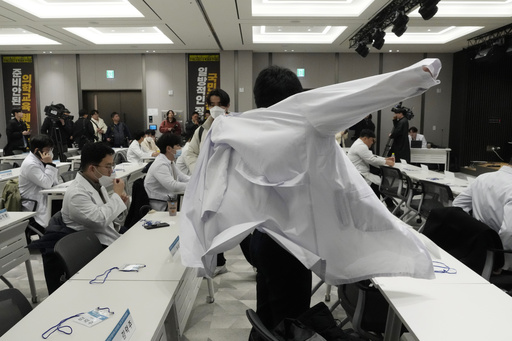SEOUL, South Korea (AP) — South Korean trainee doctors collectively walked off their jobs Tuesday to protest a government push to recruit more medical students, triggering cancellations of surgeries and other medical treatments at hospitals.
The Health Ministry urged them to return to work immediately, saying they must not endanger the lives of patients to fight the government.
As of Monday night, more than half of the 13,000 medical interns and residents in South Korea had submitted resignations, according to the Health Ministry, and 1,630 left their work sites. None of the resignations have been accepted so far.
More junior doctors are expected to follow suit. Under a decision made by their association last week, trainee doctors at the country’s five major hospitals were supposed to walk off collectively on Tuesday.
At the center of the dispute is a recent government announcement that universities would admit 2,000 more medical students starting from next year, from the current 3,058. The government says it aims to add up to 10,000 doctors by 2035 to address what it calls a shortage of doctors exacerbated by the country’s fast-aging population.
South Korea’s doctor-to-patient ratio is among the lowest in the developed world, particularly in essential but low-paying professions like pediatrics and emergency departments, and in rural areas.
Many doctors rejected the plan, saying that schools won’t be able to handle so many new students and that the funding is more urgently needed to raise medical fees. Some argue that having too many doctors could also lead to unnecessary medical treatments due to increased competition.
“Because of a bungled policy that ignores reality on the ground, I can fold up my dream of becoming a specialist in the pediatric emergency department without any regrets,” Park Dan, head of the Korean Intern Residents Association, wrote on Facebook on Monday, after submitting his resignation to Seoul’s Severance Hospital. “I have no intention of returning to work.”
The doctors’ protests have failed to generate public support, with a survey suggesting about 75% of South Koreans support the government’s push to train more doctors. Their critics argue that doctors are mainly worried their incomes would drop if there were more doctors.
“I think trainee doctors are fighting for their own interests,” said Seo Hong Soon, a 74-year-old housewife, speaking on Tuesday near Seoul National University Hospital. “We want them to remember the Hippocratic oath and make concessions. We hope they will put their duty before money.”
Most of South Korea’s 13,000 trainee doctors work at its 100 teaching hospitals, assisting senior doctors during surgery and treating inpatients. If their walkouts are prolonged or joined by senior doctors, that could cause disruptions at those hospitals and in South Korea’s overall medical service, observers say.
South Korea has a total of 140,000 doctors. The Korea Medical Association said Monday it plans to hold rallies to support the trainees but hasn’t determined whether to launch strikes.
At Seoul’s Asan Medical Center, a nurse said it’s unclear how long senior doctors could keep performing surgeries and other treatments without the assistance of junior doctors. The nurse, who requested anonymity citing the sensitivity of the issue, said that trainees typically handle skin incision and disinfection during surgeries at the direction of senior doctors and manage data on hospital computers.
She said her hospital plans to delay admissions for some cancer patients and to release inpatients early. Other Asan hospital officials said Tuesday that an unspecified number of junior doctors didn’t come to work but noted some were still working. They said the hospital is rearranging planned surgery schedules based on the conditions of patients.
Vice Health Minister Park Min-soo said authorities have received 34 public complaints related to the walkouts, 25 of them over the cancellation of surgeries. Other cases include hospitals refusing to treat patients and canceling planned medical treatments.
“If you leave your patients to oppose a government policy despite knowing what your collective action would cause, that will never be justified,? Park said. “We appeal to trainee doctors to return to patients. An act of endangering the lives of patients to express your opinions is something that you must not do.”
Lee Geon-ju, head of an association of lung cancer patients, posted a YouTube message calling for doctors and government officials to end their squabbling.
“For whatever reasons, doctors must not neglect patients to prevent them from failing to receive urgent surgeries and other treatments,” said Lee, who called himself a terminally ill cancer patient.
___
Associated Press video journalist Yong Jun Chang contributed to this report.
This website uses cookies so that we can provide you with the best user experience possible. Cookie information is stored in your browser and performs functions such as recognising you when you return to our website and helping our team to understand which sections of the website you find most interesting and useful.
